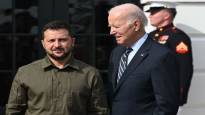KIEV In war-torn Ukraine, according to the constitution, presidential elections should be held six months from now. Now the country is debating whether elections are needed at all during the war.
A US Republican senator threw water into the mill Lindsey Grahamwho said while visiting Kyiv at the end of August, that elections must be held in Ukraine despite the Russian attack. According to Graham, free and honest elections would help Ukraine in the development of democracy.
Ukrainians do not warm to this idea. In August according to a published survey only slightly more than 12 percent of the respondents would organize the presidential elections in wartime conditions.
The Basic Law only prohibits the holding of parliamentary elections during martial law, and this year’s elections have been postponed to the future. Separate law on martial law instead bans elections and referendums at all levels as long as the country is at war.
Election campaigning is not a priority
In September, 100 Ukrainian NGOs signed the petition against elections held during martial law.
– Elections and a full-scale attack do not go together. This idea is very dangerous, it leads to the loss of the legitimacy of elections and even to the destabilization of the entire state, the petition says.
One of the signatories is an organization called Opora, which since 2005 has monitored the election process and developed democratic institutions in Ukraine. Founder of the organization and coordinator of political programs Olha Aivazovska says that there are legal and political problems associated with elections and challenges in organizing them.
– First of all, Ukraine cannot break its own legislation just to prove something to someone. Secondly, all state bodies must focus their attention on carrying out the duties required by law in exceptional circumstances and not on election campaigning, Aivazovska lists legal problems.
According to him, the biggest political challenge is related to the restriction of freedom of speech during the war. It makes genuine political discussion and campaigning almost impossible. The competition would also be made more difficult by the fact that the other candidates would not have the same visibility as the president in wartime conditions With Volodymyr Zelensky.
– In addition, Russia can use the opportunity to its advantage and drive a wedge into the unity of Ukrainian society.
Many Ukrainians would not make it to the urn
According to estimates, up to seven million Ukrainians are currently war refugees abroad. Reaching them in the elections would be exceptionally challenging.
– In the previous elections, the highest number of votes abroad was 75,000, and now it is about millions. A hundred times more polling stations should be opened in Poland alone than there were before the war, Aivazovska explains.
There are also many questions related to campaigning, for example how the election ads would reach people outside Ukraine or how the candidates could meet their voters in other countries.
A considerable part of Ukrainian voters is currently in Russian-occupied territories and cannot vote at all. Voting for soldiers fighting at the front also brings its own challenges.
According to Aivazovska, electronic voting will not solve the issue, because Ukrainians do not yet trust it enough. They also do not trust that the judiciary will punish the perpetrators of possible electoral fraud.
– The Dija application is not a solution either, because its register is held by the Ministry of Digital Development and not by the Election Board, says Aivazovska.
According to the election expert, the threat from Russia should not be underestimated either. Russia can disrupt electronic voting by hacking the system and physical voting, for example by launching a massive missile strike on election day.
Pressure attempts a political game
Former US ambassador to Ukraine John E. Herbst does not see the West pressuring Ukraine to hold presidential elections before the war is over.
– Yes, Lindsey Graham, who certainly understands the threat posed by the Russian attack to American interests, supported holding the election. Some are of the opinion that the senator wanted Ukraine to respond in this way to the criticism heard within the United States that Ukraine is not a democratic country.
Herbst was ambassador to Ukraine in 2003–2006. Today, he heads the Eurasia department at the American Atlantic Council think tank and visits Ukraine for work. He last visited Kyiv at the beginning of September.
– Ukrainians do not need to hold elections in such difficult conditions. For at least a couple of decades, they have shown that they strive for democracy, says Herbst.
Olha Aivazovska also sees no signs of pressure from the West.
– It is rather about certain political circles that would like to cut the support given to Ukraine and use as an argument that Ukraine is not a democracy because it does not hold elections, says Aivazovska.
He adds that despite possible attempts at pressure, the most important thing is the consensus of society that now is not the time for elections.
– Ukrainians are of the opinion that it is wrong to run for political office or re-elect a very popular president at the same time as our soldiers are dying on the front lines.
